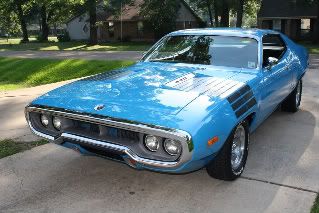horn rebuild?
Moderator: Site Administrators
horn rebuild?
Awhile back I bought a road runner horn rebuild kit. It came with the outer part casing, rivets and bracket. I am trying to find out how to use these rivets. Where can I get the tool for these rivets and what is the tool called. I've been trying to get some of the small things done while the weather remains crappy. Thanks
Re: horn rebuild?
xray wrote:Awhile back I bought a road runner horn rebuild kit. It came with the outer part casing, rivets and bracket. I am trying to find out how to use these rivets. Where can I get the tool for these rivets and what is the tool called. I've been trying to get some of the small things done while the weather remains crappy. Thanks
Here's a suggestion. Go to www.eaa.org which is the Experimental Aircraft Asociaton and see if you can find a chapter near you. If anybody knows anything about rivets and tools the folks who build airplanes probably would.

Righteous One Owner '72 Roadrunner
Horn
I'm an aviation mechanic. You need a rivet gun(hammer), and a bucking bar to sinch the rivet down. In the rivet gun, you also need a "set" which is the actual "hammer". It is the same diameter as the rivet to be hammered. The bucking bar flattens out the other end of the rivet being hammered. Does this make sense? I hope so. Let me know if I can help.
Re: Horn
I am familiar with that type of riviting. The rivits on the RR horn arent hammered like that (But I could be wrong), The rivits that came with the rebuild kit have a hollow stem is there a punch or a tool that is used for this kind of rivit? I want the horn to appear stock. Thanks for the input.rr6pak wrote:I'm an aviation mechanic. You need a rivet gun(hammer), and a bucking bar to sinch the rivet down. In the rivet gun, you also need a "set" which is the actual "hammer". It is the same diameter as the rivet to be hammered. The bucking bar flattens out the other end of the rivet being hammered. Does this make sense? I hope so. Let me know if I can help.
horn
The rivit is hollow, with a stem? If this is the case, then you have a "cherry" rivit which means you need a "cherry max" gun. This gun slips over the stem of the rivit and when you pull it, the stem does the rest. When the rivit is completely pulled, it will pop and what is left is the stem.
Re: horn
The rivit is hollow but it does not have a stem. There is no hole in the head of the rivit to accomadate a stem. I dont have the rivits handy so I am unable to take any pics of them. Take a look at your RR horn and you will see what I mean. Thanks for the input so far.rr6pak wrote:The rivit is hollow, with a stem? If this is the case, then you have a "cherry" rivit which means you need a "cherry max" gun. This gun slips over the stem of the rivit and when you pull it, the stem does the rest. When the rivit is completely pulled, it will pop and what is left is the stem.
I think what he was talking about is what I call a "blind rivet". One that has a small rod through it. You put the rivet in the holes in the two pieces you want to hold together, then drive the pin down from the head side. That expands the end of the rivet and holds the two pieces together.xray wrote:OK I did some searching and I found out I need a rivit squeezer. I saw a few on ebay. I could probably buy a new horn for less, but now I have an excuse to get myself another tool.
The rivets on the horns had the holes in them to align the tool that flattens or spreads out that side of the rivet while the head of the rivet is held in place. This can be done with a single tool that acts like a big pair of pliers, or with two tools. One to hold or "buck" the head the other that flattens the stem end of the rivet.
I have used this type of a rivet and have a simple tool that is a round rod with a smaller stem sticking out. I put the head of the rivet on a steel plate (like and anvil) then put the round rod against the other end of the rivet, using the smaller rod to keep it aligned, and hit the tool with a hammer until the rivet is spread out or flattened.
You just have to be real careful using this method to keep the rod aligned with the rivet and hit it squarely with the hammer. Otherwise the rivet will be smashed down off center and not be nice and round when it's fully seated.
If you can get some more of those type rivets, I’d suggest doing some practice so when you do the horn you get it to come out nice and neat! Practice does make perfect…well at least less mistakes!

Righteous One Owner '72 Roadrunner